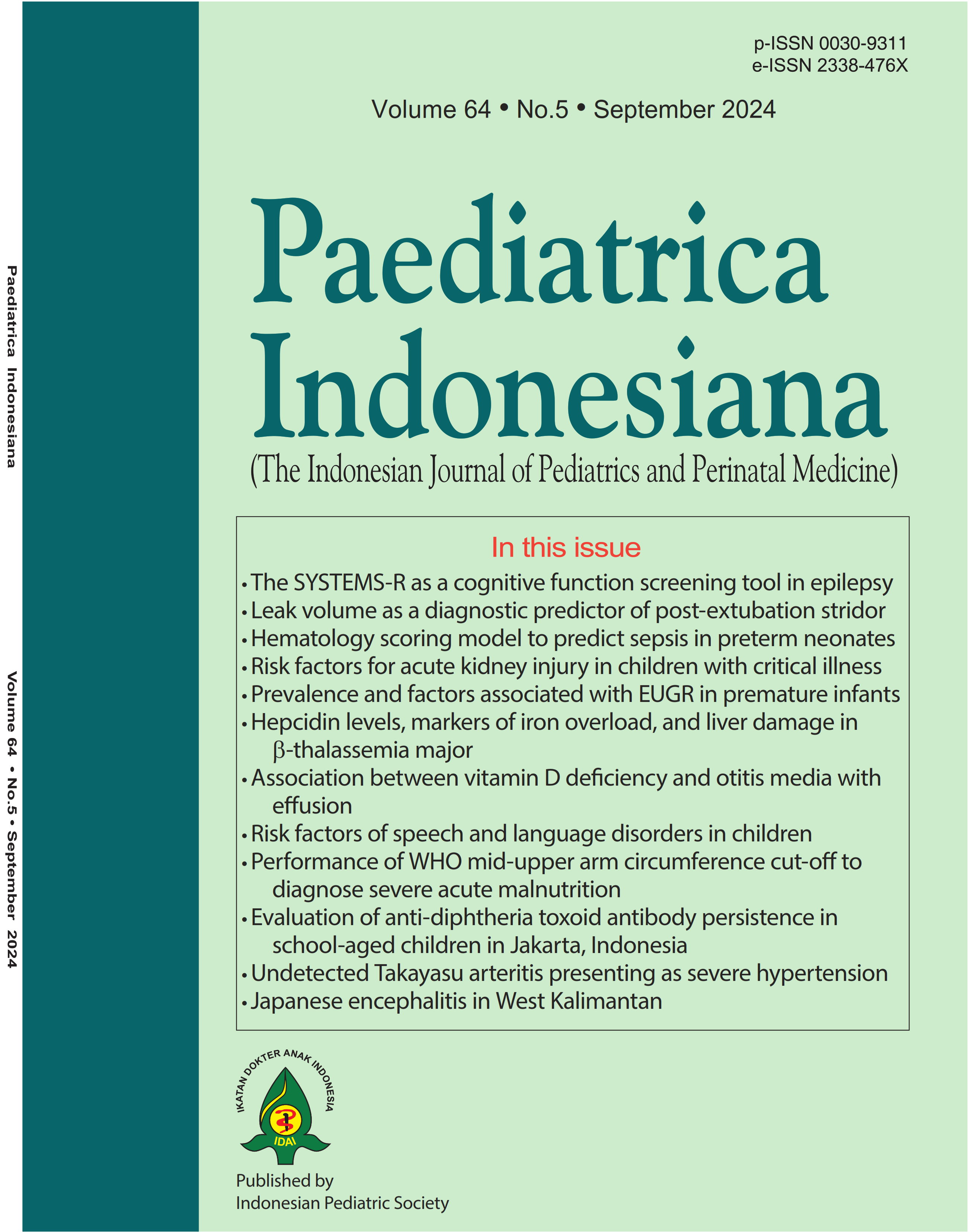The School Years Screening Test for Evaluation of Mental Status-Revised (SYSTEMS-R) as a cognitive function screening tool in children with epilepsy
Abstract
Background Children with epilepsy are at high risk of cognitive impairment that can affect quality of life. Intelligence quotient (IQ) measurement using the Wechsler Intelligence Scale for Children (WISC) is the gold standard test of cognitive function, but it is time-consuming and costly. The School Years Screening Test for Evaluation of Mental Status-Revised (SYSTEMS-R) is a potential cognitive function screening tool that can be used in children with epilepsy.
Objective To assess the performance of SYSTEMS-R as a cognitive function screening tool in children aged 6-15 years with epilepsy.
Methods This cross-sectional diagnostic test study was conducted in children aged 6-15 years with epilepsy. All subjects were assessed using both SYSTEMS-R and WISC 4th edition. The sensitivity, specificity, positive and negative predictive value, likelihood ratios of the positive and negative tests, and accuracy of SYSTEMS-R was calculated, with WISC as the gold standard test.
Results Based on the SYSTEMS-R, the prevalence of cognitive impairment in children aged 6-15 years with epilepsy in our population was 86.4%. With WISC as the gold SYSTEMS-R had 84% sensitivity, 91% specificity, 98% positive predictive value, and 47% negative predictive value. The likelihood ratio of a positive SYSTEMS-R test was 10.11 and the likelihood ratio of a negative test was 0.17. The overall accuracy of SYSTEMS-R to detect cognitive impairment was 85%.
Conclusion SYSTEMS-R has good sensitivity and specificity to assess cognitive function in children 6-15 years with epilepsy. It can be considered for widespread use in the early detection of cognitive impairment in pediatric epilepsy patients aged 6-15 years.
References
Grantham-McGregor S, Cheung YB, Cueto S, Glewwe P, Richter L, Strupp B. Developmental potential in the first 5 years for children in developing countries. Lancet. 2007;369:60–70. DOI: https://doi.org/10.1016/S0140-6736(07)60032-4
Handryastuti S, Ramli Y, Unit kerja Kordinasi Neurologi IDAI. Epilepsi pada anak. 1st ed. Jakarta: Badan Penerbit Ikatan Dokter Anak Indonesia; 2016.
Besag FMC. Cognitive and behavioral outcomes of epileptic syndromes: implications for education and clinical practice. Epilepsia. 2006;47Suppl.2:119–25. DOI: https://doi.org/10.1111/j.1528-1167.2006.00709.x
Berg AT, Langfitt JT, Testa FM, Levy SR, DiMario F, Westerveld M, et al. Global cognitive function in children with epilepsy: a community-based study. Epilepsia. 2008;49:608–14. DOI: https://doi.org/10.1111/j.1528-1167.2007.01461.x
Casey BJ, Tottenham N, Liston C, Durston S. Imaging the developing brain: what have we learned about cognitive development? Trends Cogn Sci. 2005;9(3 SPEC. ISS.):104–10. DOI: https://doi.org/10.1016/j.tics.2005.01.011
Mundkur N. Neuroplasticity in children. Indian J Pediatr. 2005;72:855–7. DOI: https://doi.org/10.1007/BF02731115
Khadijah. Pengembangan kognitif anak usia dini teori dan pengembangannya. Medan: Perdana Publishing; 2016.
Wishwadewa WN, Mangunatmadja I, Said M, Firmansyah A, Soedjatmiko S, Tridjaja B. Kualitas hidup anak epilepsi dan faktor–faktor yang mempengaruhi di Departemen Ilmu Kesehatan Anak FKUI/RSCM Jakarta. Sari Pediatri.. 2008;10:272-9. DOI: https://doi.org/10.14238/sp10.4.2008.272-9
Flanagan DP, Alfonso VC, Mascolo JT, Hale JB. The Wechsler Intelligence Scale for Children-Fourth Edition in neuropsychological practice In: Davis AS, editor. Handbook of Pediatric Neuropsychology. New York: Springer Publishing Company; 2011. p. 397–414.
Hapsari NI. Normative values and cognitive function screening in children aged 4 to 15 years old: a study with the school years screening test for the evaluation of mental status-revised (SYSTEMS-R). [thesis]. Universitas Indonesia; 2019.
Ouvrier R, Hendy J, Bornholt L, Black FH. SYSTEMS: School-Years Screening Test for the Evaluation of Mental Status. J Child Neurol. 1999;14:772–80. DOI: https://doi.org/10.1177/088307389901401202
Harsono F, Solek P, Rusmil K. Reliability of the Indonesian version of the School- Years Screening Test for Evaluation of Mental Status- Revised as a cognitive screening tool for children. Paediatr Indones. 2016;56:149–54. DOI: https://doi.org/10.14238/pi56.3.2016.149-54
Saputra HE, Handryastuti S, Mangunatmadja I, Widodo DP, Pardede SO. Ouvrier’s Modified Mini Mental State Examination as a screening test for cognitive impairment in school-aged children with epilepsy. Paediatr Indones. 2020;60:137-41. DOI: https://doi.org/10.14238/pi60.3.2020.137-41
Maharani V. Cognitive function difference in children with malnutrition and adequate nutritional status. [thesis]. Universitas Indonesia; 2015.
Mayza A., Lastri DN. Neurobehavior Dasar dan Pemeriksaannya. In: Aninditha T, Wiratman B, editors. Buku Ajar Neurologi. Jakarta: Departemen Neurologi FKUI-RSCM; 2017. p.149–80.
Blum D, Meador K, Biton V, Fakhoury T, Shneker B, Chung S, et al. Cognitive effects of lamotrigine compared with topiramate in patients with epilepsy. Neurology. 2006;67:400–6. DOI: https://doi.org/10.1212/01.wnl.0000232737.72555.06
Kim EH, Ko TS. Cognitive impairment in childhood onset epilepsy: Up-to-date information about its causes. Korean J Pediatr. 2016;59:155–64. DOI: https://doi.org/10.3345/kjp.2016.59.4.155
Nanik. Penelusuran karakteristik hasil tes inteligensi WISC pada anak dengan gangguan pemusatan perhatian dan hiperaktivitas. J Psikologi. 2015;34:18–39. DOI: https://doi.org/10.22146/jpsi.7087
Lenck-Santini PP, Scott RC. Mechanisms responsible for cognitive impairment in epilepsy. Cold Spring Harb Perspect Med. 2015;5: a022772. DOI: https://doi.org/10.1101/cshperspect.a022772
Lopes AF, Simões MR, Monteiro JP, Fonseca MJ, Martins C, Ventosa L, et al. Intellectual functioning in children with epilepsy: frontal lobe epilepsy, childhood absence epilepsy and benign epilepsy with centro-temporal spikes. Seizure. 2013;22:886–92. DOI: https://doi.org/10.1016/j.seizure.2013.08.002
Ouvrier RA, Goldsmith RF, Ouvrier S, Williams IC. The value of the mini-mental state examination in childhood: a preliminary study. J Child Neurol. 1993;8:145–8. DOI: https://doi.org/10.1177/088307389300800206
Masters K. Edgar Dale’s Pyramid of Learning in medical education: a literature review. Med Teach. 2013;35:e1584-93. DOI: https://doi.org/10.3109/0142159X.2013.800636
NICE. Epilepsies in children, young people and adults: diagnosis and management. London: National Institute for Health and Care Excellence; 2022.
Copyright (c) 2024 Urfianty Urfianty

This work is licensed under a Creative Commons Attribution-NonCommercial-ShareAlike 4.0 International License.
Authors who publish with this journal agree to the following terms:
Authors retain copyright and grant the journal right of first publication with the work simultaneously licensed under a Creative Commons Attribution License that allows others to share the work with an acknowledgement of the work's authorship and initial publication in this journal.
Authors are able to enter into separate, additional contractual arrangements for the non-exclusive distribution of the journal's published version of the work (e.g., post it to an institutional repository or publish it in a book), with an acknowledgement of its initial publication in this journal.
Accepted 2024-10-14
Published 2024-10-14













